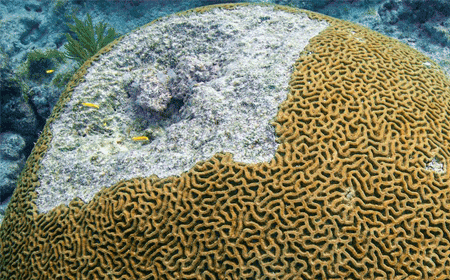Since first being detected in 2014 in Florida, the Caribbean has observed the gradual and unstoppable spread of the, Stony Coral Tissue Loss Disease, reaching as far east as the island of Saint Martin. Last year the disease reached the southern reefs off the coast of Yucatan.
This year, the Belize Fisheries Department and Blue Ventures personnel reported high rates of infection and mortality of coral colonies in the northern part of the Belize Barrier Reef within the Bacalar Chico Marine Reserve.
Resource managers, including marine protected areas managers, are on the lookout for the occurrence of this coral disease that causes tissue loss. The disease leads to high mortality of the 20 hard coral species that are susceptible to the disease, including brain corals.
So far, the branching Acroporid corals seem not to be resistant to the disease. This disease pathogen has not been identified and scientists continue to work to isolate and identify the pathogen. Various treatments are being tested and it is hoped that the pathogen can be identified and a safe and effective treatment can be found.
The progression of the disease has proven to be very rapid and what took over a century to grow, an entire colony, can be completely dead in 15 days to a month. It is believed that the disease is water-borne. Currently, the National Coral Reef Monitoring Network (NCRMN), network of MPA Mangers, Environmental Resource Institute, (ERI), conservation NGO’s and the Belize Fisheries Department continue to track the spread of the disease and have formulated a response plan that is focussed on detecting the occurrence, and testing treatments.
Coral reef scientist and climate change specialist, Nadia Bood, of World Wildlife Fund in Belize, noted that this disease adds to pressures already being experienced by the coral reef in Belize from climate change. Alerts were sent out in September and October for Belize to look out for bleaching due to high surface water temperatures.
Bood said “We will need the involvement of all stakeholders, especially fishers and marine tour guides and operators, to assist the Belize Fisheries Department in reporting signs of bleaching and disease.”
Bood also urged the private sectors that benefit from the coral reefs ecosystem services, including resorts and property owners on the cayes and along the coast, to incorporate zero-effluent standards and closed sewage systems into their construction. Poor water quality as a result of run-off and sewage leaching has been linked to the spread of other coral reef diseases, since it weakens the health of coral colonies, making them susceptible to disease.
“Ecosystem-based adaptation provides a golden opportunity for countries like Belize to cost-effectively adapt to these harsh changes in the environment using ecosystems such as coral reefs, mangroves and seagrass. This approach benefits multiple stakeholder sectors, including tourism and fisheries, but also affords coastal protection from other potential threats such as storms.”

